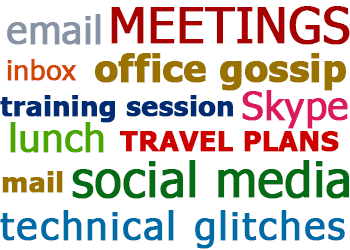“Mine, give it back!”
“No! I don’t want to!”
Have you ever heard a two-year-old say this? My son does—he says exactly what he wants, no questions asked. Over the next 20 years of his life, my son will learn to share his things, not just his feelings. He will come to understand that while his needs are important, so is caring about the feelings of others. He will apply discipline and filters to his emotions in order to cooperate with goals that are larger and longer-term than his immediate impulses.
As employees develop and progress in their early career, sometimes they mistakenly get the message that the most desirable kind of worker is a people-pleaser who will never disagree. When difficulties arise with their work, they keep struggling without bringing it up for fear of rocking the boat. In reality, people—not machines—are a business’s most valuable asset, and people have opinions, feelings, talents, and weaknesses.
The most successful employees develop effective interpersonal skills in addition to mastering their hands-on job functions. They learn how to disagree while remaining professional and result oriented. By taking an active role in their professional relationships, they are able to take advantage of more growth opportunities and to shape their career to a far greater degree than their more passive colleagues.
“Mine, Give it Back!”
Employees grow through their responsibilities and achievements. When a manager reduces your job responsibilities, or one of your major customers leaves for the competition, it can feel like a personal reflection on your abilities as an employee. It is sometimes appropriate to show initiative and take action to get back what you lost, or to reach beyond what your current role offers.
 If the situation arose due to your mistake, own it and provide an action plan (if appropriate) to correct what went wrong. Rather than insisting on fairness, list the positive results that you can achieve and how you plan to get there.
If the situation arose due to your mistake, own it and provide an action plan (if appropriate) to correct what went wrong. Rather than insisting on fairness, list the positive results that you can achieve and how you plan to get there.
If the situation is a stagnant job, a lost client, or another unfair loss of responsibility, take time to distill your frustrations into a clear, accurate list of prioritized goals. Set a timeline and an action plan for how to achieve them. Ask for the opportunity to prove yourself and demonstrate an understanding of what needs to happen in order to get a result that will benefit the company. Show respect for yourself and your abilities as well as for the needs of the organization.
How to say it:
- “Although I didn’t hit my target last quarter, I’m determined to exceed my quota this quarter. Here’s my plan to improve on my performance.”
- To a client: “I’m committed to winning back your trust.”
- “I would love another chance to prove myself on this project.”
- “I’m ready to take on additional responsibility. I know that I can contribute a lot to the company’s bottom line with a larger sales region.”
- “What results do I need to show in order to earn a promotion?”
- “I’m motivated to move into a management position in the next few years. Can we talk about how I can get there?”
What not to say:
- “That isn’t fair.”
- “But what about me?”
- “I deserve to have that.”
- “It’s not my fault.”
- “You can’t do that.”
“No, I don’t want to.”

Some projects are neither necessary nor realistic. Sometimes you can give more value by doing something else. Although C-level and hourly employees are both crucial to a company’s success, it is a poor use of time and money to ask the VP of Sales to do repetitive data entry.
Although successful employees are versatile and willing to do what needs to be done, they also recognize which tasks are unproductive or disadvantageous. Agreeing to every task can actually make you seem less qualified—not to mention that it quickly leads to an overwhelming inbox full of difficult tasks that no one else wants to do.
Cultivate an open dialogue with your team and superiors, and deliver consistently good work on time. When a thankless task lands on your desk, you will be able to honestly say that you can do more for the company’s bottom line by avoiding the task. Standing up for yourself is good for both your personal and professional growth—as long as you back it up with excellent work.
How to say it:
Demonstrate that you understand the situation, explain the obstacle without patronizing, and make an effort to find a workable solution whenever possible. Emphasize the positive result and be flexible where you can.
- “I have several reports due by Friday—can we rework the timeline for this new project?”
- “I don’t have a background in design, but Jessie mentioned that she wanted to take on more work like this. She might be interested in this project.” (Check with colleagues before volunteering them for more work.)
- “I need additional support to deliver this contract on time. Are there reps available to help with the data entry so I can focus on closing the deal with management?”
- “What if we did this a different way? I’m spending about two hours a day manually entering data, but I could spend more time making sales if we used an automation tool.”
- “I’m sorry. I can’t take on that additional work right now.” (This works best for colleagues who are asking you for help with their work, not for a superior.)
- “My preference is to focus more on marketing. That’s my background, and it’s what I love.”
- “I could do that project with some additional training.”
- “I’m struggling with this task. Can we talk about it?”
- “Can you explain how this task contributes to the project goals? I can contribute more by focusing on sales calls instead of graphic design.”
What not to say:
Giving the excuse that you’re unqualified to do a task says:
- “That’s beneath me.”
- “I can’t.”
- “That’s not in my job description.”
- “I just don’t like that.”
- “That makes no sense.”
- Refusing with no explanation.
A Final Word
Toddler temper tantrums don’t fly in the workplace, but that doesn’t mean you should never speak up about your feelings. Respectful disagreements demonstrate professionalism and give your manager valuable feedback that they might otherwise miss. Their goal is productivity and results, which are difficult to achieve with disengaged and unhappy employees. By voicing problems and suggesting a better way, you can improve your company’s production as well as improving the arc of your own career.



